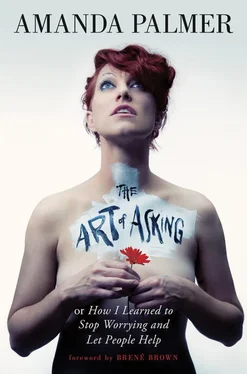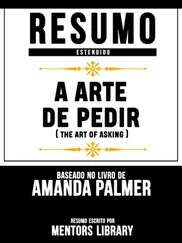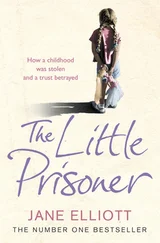• • •
The next days were filled with a steady onslaught of unsettling images and news. The manhunt for the alleged bombers—two young brothers. The city lockdown, during which planes were grounded, trains were canceled. I was supposed to play a show in New York; getting there seemed unlikely. I found myself obsessed by the horror of imagining what makes a person do something so terrible, and imagining the pain of the victims, suddenly legless. I heard about Dzhokhar Tsarnaev, the surviving alleged bomber, a nineteen-year-old they finally found hiding at the bottom of a boat, and who—I found out through the news on NPR—had been a friend of my friend’s high-school-aged kid. I heard the story about how they hijacked a car and tried to make their way to New York. It was all close to home.
A few days later, after a yoga class, I went back to the same café I’d been sitting in when the news of the bombing hit, and blogged a stream-of-consciousness mishmash of thoughts about my life, the lives of my friends, and about the teenager at the bottom of the boat, in the form of a free-verse poem.
You don’t know how to stop picking at your fingers.
You don’t know how many Vietnamese soft rolls to order.
You don’t know how things could change so incredibly fast.
You don’t know how little you’ve been paying attention until you look down at your legs again.
You don’t know how to drive this car.
You don’t know how precious your iPhone battery time was until you’re hiding in the bottom of the boat.
You don’t know how to mourn your dead brother.
You don’t know how claustrophobic your house is until you can’t leave it.
You don’t know the way to New York.
There were thirty-five such lines. I didn’t think it was a great poem. It was just a collection of my own feelings and impressions. The coincidences. The blender. The dots.
I called the blog “A Poem for Dzhokhar.” The fans read it, and within a few moments sent back tweets and comments of understanding; a lot of them had been online with me the night of the bombing. But three hours later, the blog post had gotten over a thousand comments, and the poem was being linked to on right-wing news sites as an example of liberal evil. Some critics of the poem (who weren’t all strangers, by the way; some were within the fanbase) asked:
How could you be so insensitive? How dare you shamelessly promote yourself by writing a poem about this?
One news website said it was “the worst poem ever written in the English language.” A television news commentator that night called it, “Amanda Palmer’s love poem to a terrorist.”
There was nothing about loving terrorists in the poem.
The onslaught continued over the next few days. There were two thousand comments on the blog, almost all of them hate-filled and outraged. Strangers started posting limericks, suggesting with or without humor that I should have my own legs blown off. Blog comments included sarcastic haikus and limericks, some of which were competent parodies of my own poem, and some were more along the lines of:
Roses are red
Violets are blue
Fuck you fuck you
Fuck you fuck you
And in response, my own readers posted their own poems about empathy and non-violence. Then someone told me it was national poetry month. Timing is everything.
My Twitter feed was filling up with angry comments so fast I couldn’t even keep up with it. And I stopped wanting to—it hurt too much. People were calling me a monster.
In the aftermath of the bombing, one journalist and mother of a son said on the radio that her initial reaction had been motherly worry for the bomber. And another local journalist wrote an op-ed wondering if this trend of empathy had gone too far.
Wondering if this trend of empathy had gone too far?
To erase the possibility of empathy is to erase the possibility of understanding.
To erase the possibility of empathy is also to erase the possibility of art. Theater, fiction, horror stories, love stories. This is what art does. Good or bad, it imagines the insides, the heart of the other, whether that heart is full of light or trapped in darkness.
• • •
Here is one successful recipe I have used to deal with haters, trolling, bullying, and other manifestations of critical voices. We all have them.
Take the scathing article, hurtful office gossip, or nasty online comment.
Hold it in your mind.
Now imagine the scathing article, hurtful office gossip, or nasty online comment being aimed at the Dalai Lama.
Now imagine the Dalai Lama is reading or hearing the scathing article, hurtful office gossip, or nasty online comment.
If it helps, you can get specific here and think up something like: HEY DALAI LAMA! UR DUMB AS SHIT & UGLY & BALD & WHO DO U THINK U R TRYING TO FREE PEOPLE?? FUCK U
Or, if that isn’t working for you, a subtler approach:
Dear Dalai Lama. With all respect, I find your approach to peace highly problematic. If you would stop narcissistically meditating and pretending to “help” people, perhaps you would actually be a force of good in the world. Sincerely, a former fan .
Now imagine the Dalai Lama’s reaction. He may smile, frown, or laugh—but he will undoubtedly feel compassion for the author of the scathing article, hurtful office gossip, or nasty online comment.
You can substitute the compassionate/holy/serene being of your choice. It may work to use Jesus, Joan Baez, Yoda, or your kind-eyed but strong-as-an-ox great-aunt Maggie.
Rinse and repeat as needed.
• • •
About a week after I wrote the poem, I turned thirty-seven. I was in Seattle to deliver a handful of Kickstarter parties. It was hard to leave Anthony, but I was happy to leave Boston for a few days. Neil came with me for the start of the trip, so we could celebrate my birthday together.
I was miserable, visibly drained, and verging on a shade of depression that I hadn’t felt since my blackest college years. I was tired of feeling hated. Tired of explaining myself. Tired of thinking about it. Tired of Anthony being sick and not knowing whether he would live or die. I didn’t even want a birthday. It seemed pointless and unnecessary.
We hadn’t made any plans for the day in Seattle except to not do any work—and to stay away from the Internet, which was still roiling with hateful comments and bomb limericks. Things had gotten bad. Someone had just suggested on Twitter that I should have a bomb shoved up my cunt.
When we woke up on the morning of my birthday, it was freezing cold, dark, and slashing down rain.
So what do you want to do today, birthday girl? Neil asked lovingly.
I dunno , I said. Stay in bed. Vanish. Die .
Well if you’re going to die, let’s eat first. I’m hungry. Would you like some lunch?
No .
We found a quiet little Japanese restaurant, where I sat with my sunglasses on, feeling sorry for myself, and staring into my miso soup.
Darling , Neil said. It’s going to blow over. Trust me. I’ve never seen you this unhappy .
Sorry .
Is there nothing we can do? Let’s do something nice, okay? We could try to find a place to get you a birthday massage. Want a massage?
I looked up from my soup. Neil. He was trying so hard. He was so kind.
I’d taken a few flights that week, and my back hurt. And my neck hurt. And my head hurt.
Yes. I’d love a massage. That’d be wonderful .
I left to go to the bathroom, and Neil started typing into his phone. When I came back, he said, I found a massage place right near here and booked online, using a little form! Isn’t the Internet amazing?
Читать дальше












